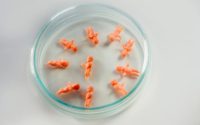FDA could approve pill for postpartum depression in August
A first-of-its-kind pill for postpartum depression could be available to women in the US by August.
The medication, called Zuranolone, is an antidepressant that is only taken for two weeks and is in a class of drugs that target GABA receptors — which control signaling in the central nervous system — in the brain using a substance called neurosteroid.
Sage Therapeutics and Biogen said Monday the Food and Drug Administration could approve the new medication by Aug. 6.
“We see potential for zuranolone, if approved, to be a meaningful new option that can help address the serious unmet need faced by the diverse populations struggling with [major depressive disorder] MDD and PPD,” Dr. Priya Singhal, Biogen’s executive vice president and head of research, said.
The companies saw great results in their trials. In the Phase 3 SKYLARK randomized study, the scientists measured women with OOD based on the 17-item Hamilton Rating Scale for Depression (HAMD-17).
A score of 20 or higher indicated moderate to severe depression, while a score of zero to seven was considered “normal.”
Those with higher scores usually required entry into a clinical trial and women were enrolled into the trial if they were less than six months post-birth and had a major depressive episode starting during the third trimester or before four weeks postpartum.
Women who received the Zuranolone at a 50mg dose every evening for two weeks had a lower HAMD score than those who took a placebo pill.
Depression causes the neurotransmitters GABA and glutamate to be thrown off balance, which in turn affects neuron activity.

Treatments for depression typically focus on boosting serotonin levels, but research is starting to show that the GABA receptors may be as effective.
Zuranolone is designed to rebalance brain networks responsible for mood, arousal, behavior and cognition.
The only other drug currently available to treat postpartum depression is Zulresso, which is administered through an IV continuously for 60 hours.
“We feel a tremendous responsibility to patients with MDD and PPD to deliver a potential new treatment option, which is so desperately needed,” Dr. Laura Gault, the chief medical officer at Sage, said. “Most current approved therapies may take weeks or months to work. We are committed to advancing treatments that could help physicians and patients by addressing depression symptoms quickly.”

Around one in seven women experience PPD, according to the National Institute of Health.
Postpartum depression may be mistaken for “baby blues” at first — which only lasts a few days to a week after the baby is born — but the symptoms of PPD are more severe and last longer.
Symptoms typically develop within the first few weeks after giving birth, but could also begin during pregnancy or even up to a year after birth, according to Mayo Clinic.
Symptoms can include crying too much, difficulty bonding with the baby, withdrawing from friends and family, loss of interest in activities you enjoy, severe anxiety and panic attacks.
“The FDA filing acceptance and granting of priority review are important milestones in the mission Biogen and our collaboration partner Sage share to advance the understanding and treatment of depression,” Singhal said.


